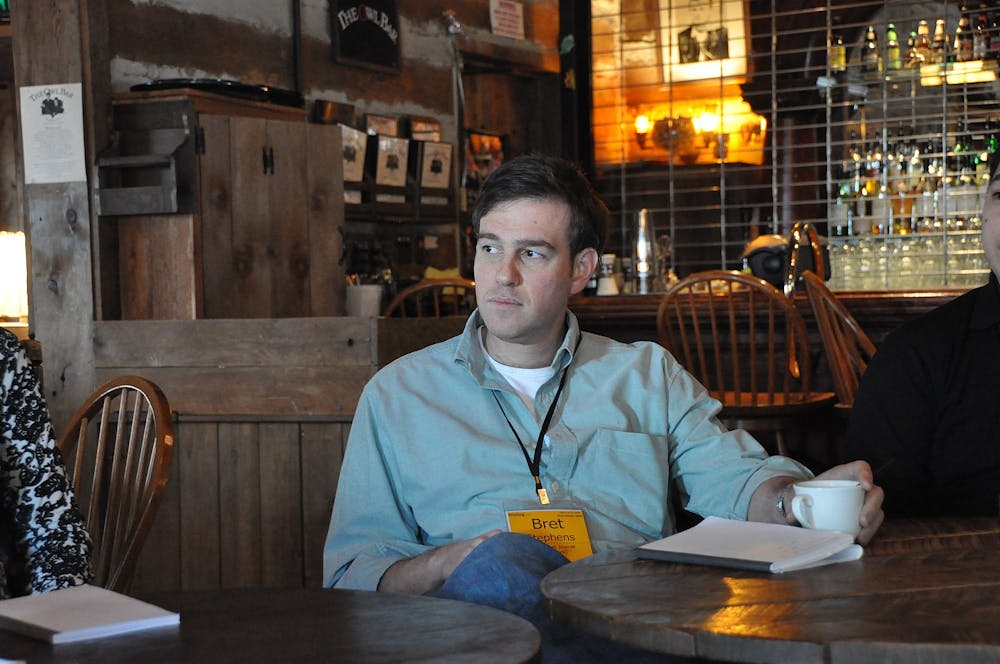“The whole tenor of the Republican Party with its disdain not just for immigration but for democracy itself is sickening to behold,” Pulitzer Prize-winning journalist Bret Stephens said at an event at Duke on Thursday.
Stephens, a columnist for the New York Times and self-identified conservative, was joined in conversation by Frank Bruni, Times opinion contributor and Eugene C. Patterson professor of the practice of journalism and public policy.
Conservatism and political discourse
Titled “Is American Conservatism Dead?”, the speaker event focused on modern-day American conservatism and the upcoming midterm elections. The discussion also touched on immigration, antisemitism, and the state of journalism.
Bruni opened the event by asking Stephens about “The Conversation,” a current events column Stephens publishes weekly in the Times with his colleague Gail Collins. The column is formatted as a conversation between Collins and Stephens, and the pair often openly disagree.
“The idea is that we are trying to play a game of tennis, but not play it for points,” Stephens said. “We're just trying to keep the ball in the air. And it's called a conversation. It's not called an argument.”
Stephens believes that his column should serve as a model for peaceful political discourse in “a day and age where people think that political differences should always lead to some form of Mortal Kombat.”
This sentiment resonated with students like sophomore Alexandra Ahdoot, who was in attendance Thursday.
“I think it’s so important that we’re bringing speakers like Bret Stephens to our campus because he just gives a very good perspective about open-mindedness and the importance of civil discourse and open dialogue,” she said.
Stephens has been an outspoken critic of former President Donald Trump since the 2016 election, writing anti-Trump columns for both the Wall Street Journal and the Times. He referred to a “brain death of the Republican party” as a “national tragedy” during the event, explaining that he has changed his party affiliation from Republican to independent.
Stephens also outlined what he sees as the role of conservatism in a democratic society.
“Every healthy society needs a healthy conservative party. Why? Because conservatism is not just an ideology. It’s an instinct; it’s a tendency; it’s a temperament,” he said. “And that temperament needs to find political expressions which are constructive and healthy and actually contribute something to a richer and fuller and more meaningful type of political discourse and dialogue.”
Stephens said that the current Republican party is “unhealthy” and “malignant” and has “fascistic and frequently cruel” features.
Stephens decried Republican immigration policies, specifically condemning politicians that use bigotry to advance their own agenda. He remarked that labeling “desperate human beings who are coming to our shores” as “some kind of alien force” is antithetical to American values.
His criticism also extended to the Democratic party. Stephens implored liberals to stop engaging in “a politics of condescension” and to instead separate people from their political opinions.
“Don't put anyone in a basket of deplorables,” he said, addressing Democrats in the audience.
Student attendee Anna Sorensen, a first-year, identifies as a Democrat but agreed with Stephens’ critique of liberal elitism and condescension.
“I think coming from New York and especially the private school system in New York, that’s something that is incredibly relevant,” she said.
Antisemitism on campus and in politics
Stephens, who is Jewish and the former editor-in-chief of the Jerusalem Post, also called out antisemitism on both ends of the political spectrum. He spoke specifically about antisemitism on college campuses, which he believes is often disguised as anti-Zionism by those on the left.
“Lots of Jewish students will tell you: ‘I am afraid to be visibly Jewish’, or ‘I'm afraid to express certain opinions because I feel like I'm going to be canceled,’” he said, arguing that it is the responsibility of administrators to protect Jewish students.
Stephens also warned the audience about antisemitism on the right, where politicians and individuals may simultaneously support Israel and promote antisemitic rhetoric.
The future of journalism
Stephens categorically rejected the notion that journalism is a dying industry.
“The world is always going to need people who can accurately tell the world's stories, and tell them in a way that is meaningful and factual and fair and true,” he said. “Whatever the medium and whatever the transitions between one medium [and] the next, I think that need is going to be permanent. In fact, I think it's growing.”
Before closing out the event, Stephens spoke to students’ anxieties about entering the professional world, reflecting on his own experience as a young journalist.
“When I was in my 20s, I felt like … I was walking through life with a giant zit on my lip, and a hole in a bad place in my pants, like I just felt continually, constantly embarrassed,” he said.
“Graduating college is a difficult event, because all of a sudden, there's not another grade to go to,” he said. “Suddenly you are launched into the world. It's like a second birth. It's a very discombobulating period of time when you make mistakes … But you will find your feet. I don't know how, but I assure you will.”
Get The Chronicle straight to your inbox
Signup for our weekly newsletter. Cancel at any time.
Mia Penner is a Trinity junior and an audience engagement editor of The Chronicle's 120th volume.

